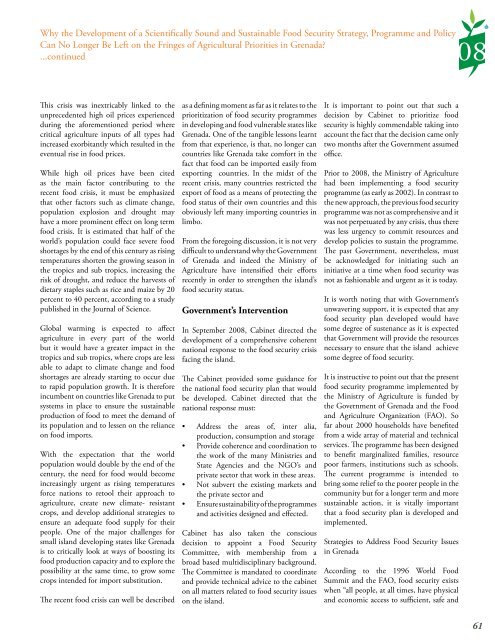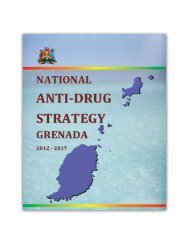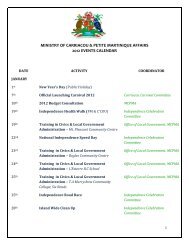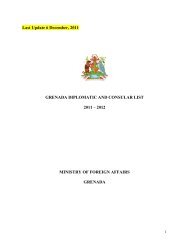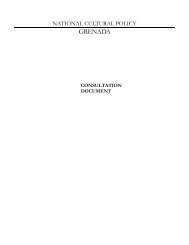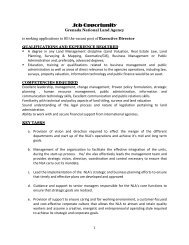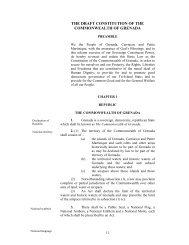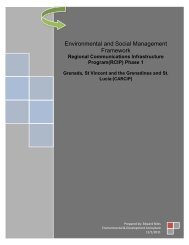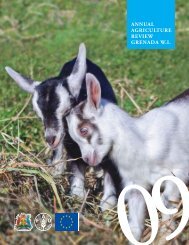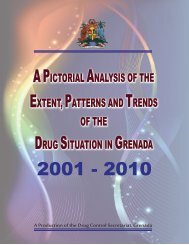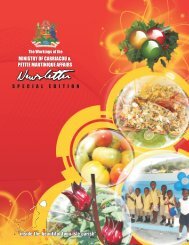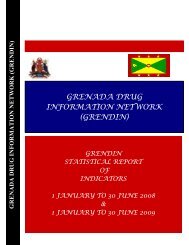Annual Agriculture Review 2008 - Government of Grenada
Annual Agriculture Review 2008 - Government of Grenada
Annual Agriculture Review 2008 - Government of Grenada
Create successful ePaper yourself
Turn your PDF publications into a flip-book with our unique Google optimized e-Paper software.
Why the Development <strong>of</strong> a Scientifically Sound and Sustainable Food Security Strategy, Programme and Policy<br />
Can No Longer Be Left on the Fringes <strong>of</strong> Agricultural Priorities in <strong>Grenada</strong>?<br />
...continued<br />
This crisis was inextricably linked to the<br />
unprecedented high oil prices experienced<br />
during the aforementioned period where<br />
critical agriculture inputs <strong>of</strong> all types had<br />
increased exorbitantly which resulted in the<br />
eventual rise in food prices.<br />
While high oil prices have been cited<br />
as the main factor contributing to the<br />
recent food crisis, it must be emphasized<br />
that other factors such as climate change,<br />
population explosion and drought may<br />
have a more prominent effect on long term<br />
food crisis. It is estimated that half <strong>of</strong> the<br />
world’s population could face severe food<br />
shortages by the end <strong>of</strong> this century as rising<br />
temperatures shorten the growing season in<br />
the tropics and sub tropics, increasing the<br />
risk <strong>of</strong> drought, and reduce the harvests <strong>of</strong><br />
dietary staples such as rice and maize by 20<br />
percent to 40 percent, according to a study<br />
published in the Journal <strong>of</strong> Science.<br />
Global warming is expected to affect<br />
agriculture in every part <strong>of</strong> the world<br />
but it would have a greater impact in the<br />
tropics and sub tropics, where crops are less<br />
able to adapt to climate change and food<br />
shortages are already starting to occur due<br />
to rapid population growth. It is therefore<br />
incumbent on countries like <strong>Grenada</strong> to put<br />
systems in place to ensure the sustainable<br />
production <strong>of</strong> food to meet the demand <strong>of</strong><br />
its population and to lessen on the reliance<br />
on food imports.<br />
With the expectation that the world<br />
population would double by the end <strong>of</strong> the<br />
century, the need for food would become<br />
increasingly urgent as rising temperatures<br />
force nations to retool their approach to<br />
agriculture, create new climate- resistant<br />
crops, and develop additional strategies to<br />
ensure an adequate food supply for their<br />
people. One <strong>of</strong> the major challenges for<br />
small island developing states like <strong>Grenada</strong><br />
is to critically look at ways <strong>of</strong> boosting its<br />
food production capacity and to explore the<br />
possibility at the same time, to grow some<br />
crops intended for import substitution.<br />
The recent food crisis can well be described<br />
as a defining moment as far as it relates to the<br />
prioritization <strong>of</strong> food security programmes<br />
in developing and food vulnerable states like<br />
<strong>Grenada</strong>. One <strong>of</strong> the tangible lessons learnt<br />
from that experience, is that, no longer can<br />
countries like <strong>Grenada</strong> take comfort in the<br />
fact that food can be imported easily from<br />
exporting countries. In the midst <strong>of</strong> the<br />
recent crisis, many countries restricted the<br />
export <strong>of</strong> food as a means <strong>of</strong> protecting the<br />
food status <strong>of</strong> their own countries and this<br />
obviously left many importing countries in<br />
limbo.<br />
From the foregoing discussion, it is not very<br />
difficult to understand why the <strong>Government</strong><br />
<strong>of</strong> <strong>Grenada</strong> and indeed the Ministry <strong>of</strong><br />
<strong>Agriculture</strong> have intensified their efforts<br />
recently in order to strengthen the island’s<br />
food security status.<br />
<strong>Government</strong>’s Intervention<br />
In September <strong>2008</strong>, Cabinet directed the<br />
development <strong>of</strong> a comprehensive coherent<br />
national response to the food security crisis<br />
facing the island.<br />
The Cabinet provided some guidance for<br />
the national food security plan that would<br />
be developed. Cabinet directed that the<br />
national response must:<br />
• Address the areas <strong>of</strong>, inter alia,<br />
production, consumption and storage<br />
• Provide coherence and coordination to<br />
the work <strong>of</strong> the many Ministries and<br />
State Agencies and the NGO’s and<br />
private sector that work in these areas.<br />
• Not subvert the existing markets and<br />
the private sector and<br />
• Ensure sustainability <strong>of</strong> the programmes<br />
and activities designed and effected.<br />
Cabinet has also taken the conscious<br />
decision to appoint a Food Security<br />
Committee, with membership from a<br />
broad based multidisciplinary background.<br />
The Committee is mandated to coordinate<br />
and provide technical advice to the cabinet<br />
on all matters related to food security issues<br />
on the island.<br />
It is important to point out that such a<br />
decision by Cabinet to prioritize food<br />
security is highly commendable taking into<br />
account the fact that the decision came only<br />
two months after the <strong>Government</strong> assumed<br />
<strong>of</strong>fice.<br />
Prior to <strong>2008</strong>, the Ministry <strong>of</strong> <strong>Agriculture</strong><br />
had been implementing a food security<br />
programme (as early as 2002). In contrast to<br />
the new approach, the previous food security<br />
programme was not as comprehensive and it<br />
was not perpetuated by any crisis, thus there<br />
was less urgency to commit resources and<br />
develop policies to sustain the programme.<br />
The past <strong>Government</strong>, nevertheless, must<br />
be acknowledged for initiating such an<br />
initiative at a time when food security was<br />
not as fashionable and urgent as it is today.<br />
It is worth noting that with <strong>Government</strong>’s<br />
unwavering support, it is expected that any<br />
food security plan developed would have<br />
some degree <strong>of</strong> sustenance as it is expected<br />
that <strong>Government</strong> will provide the resources<br />
necessary to ensure that the island achieve<br />
some degree <strong>of</strong> food security.<br />
It is instructive to point out that the present<br />
food security programme implemented by<br />
the Ministry <strong>of</strong> <strong>Agriculture</strong> is funded by<br />
the <strong>Government</strong> <strong>of</strong> <strong>Grenada</strong> and the Food<br />
and <strong>Agriculture</strong> Organization (FAO). So<br />
far about 2000 households have benefited<br />
from a wide array <strong>of</strong> material and technical<br />
services. The programme has been designed<br />
to benefit marginalized families, resource<br />
poor farmers, institutions such as schools.<br />
The current programme is intended to<br />
bring some relief to the poorer people in the<br />
community but for a longer term and more<br />
sustainable action, it is vitally important<br />
that a food security plan is developed and<br />
implemented.<br />
Strategies to Address Food Security Issues<br />
in <strong>Grenada</strong><br />
According to the 1996 World Food<br />
Summit and the FAO, food security exists<br />
when “all people, at all times, have physical<br />
and economic access to sufficient, safe and<br />
61


